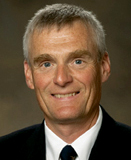Dr. Thomas Cogbill - Reflections on Being ABS Chair
May 2013
Dr. Cogbill reflects on being first at-large director to become chair of the ABS
-
Never in my wildest dreams at any point in my career did I imagine that I might be elected as a director of the American Board of Surgery, much less chair of the ABS. In 1982, following residency at the University of Colorado, I joined the staff of the Gundersen Clinic in La Crosse, Wisconsin—a large multispecialty group practice which sponsored a small surgery residency. Over the ensuing 31 years, it has been a great place to practice surgery with wonderful patients, tremendous clinical variety, and fantastic partners. I was the program director of the surgery residency from 1990 to 2010, during which time the residency grew in academic strength and in numbers, currently graduating three chief residents per year.

Prior to my election to the ABS board in 2006, my relationship with the board was limited to my individual experience with certification and my role as residency program director. Because certification was so important, I always had great respect for the ABS. However, I, like most candidates, found the examination process to be intimidating. Although I had the impression that the examinations were comprehensive and fair, I had no idea of the effort necessary to produce them. As a program director, my communications with the ABS had been largely regulatory—updates on resident promotion, explaining decisions concerning residents, and completing resident graduate applications for ABS certification. Through all of these contacts, I always felt that the ABS was a "larger than life" institution that would never have me as a member.
When the at-large ABS director positions were announced in 2005, I was very interested in nomination. I felt that I might be able to offer a different perspective than many of the other directors who had come from university surgery settings. My opinions would emanate from my experience in the practice of general surgery in a large multispecialty group from the Midwest. In addition, I could offer the perspective of a small, non-university surgery residency that was committed to general surgery training. Personally, a position on the ABS would give me a chance to influence changes in surgical education and potentially help to set the course for surgery in the United States over the next decade—two goals that I would not otherwise have been able to achieve given the career path that I had chosen.
My experience as an ABS director over the past seven years has been both enjoyable and enlightening. I have learned firsthand that the ABS goes to great lengths to assure that the examination process is comprehensive, relevant, and fair, as the result of the collaborative work of the directors, psychometricians, question writers, associate examiners, and board staff. Although the certification examinations may still be intimidating and maintenance of certification may appear onerous to some, there are concerted efforts at ABS to ensure that this process meets the needs of the public while limiting the burden on our diplomates.
I have been particularly impressed that the ABS directors and board staff are extremely hard-working and leave their personal agendas at home in order to seek the most reasonable solutions to the many challenges facing surgical training and certification. The process for discussions at ABS is thoughtful and deliberate with exceptional effort to anticipate unintended consequences of each action. The ABS board of directors has been inclusive, respectful, and attentive to each of its members. Rather than close-minded or narrow, I have always found the board to be receptive to innovative ideas and divergent opinions. Foremost in the discussions of any controversial topic at the board has been a common goal of all of the directors—to reach solutions which serve our future patients and the public well.
I have been extremely fortunate to have served on the ABS. The camaraderie on this board has resulted in friendships with a talented group of committed professionals whom I would otherwise never have known. It has been a tremendous honor to be part of an organization which sets the standards for surgical care in the United States through certification.
Thomas H. Cogbill, M.D.
May 2013
